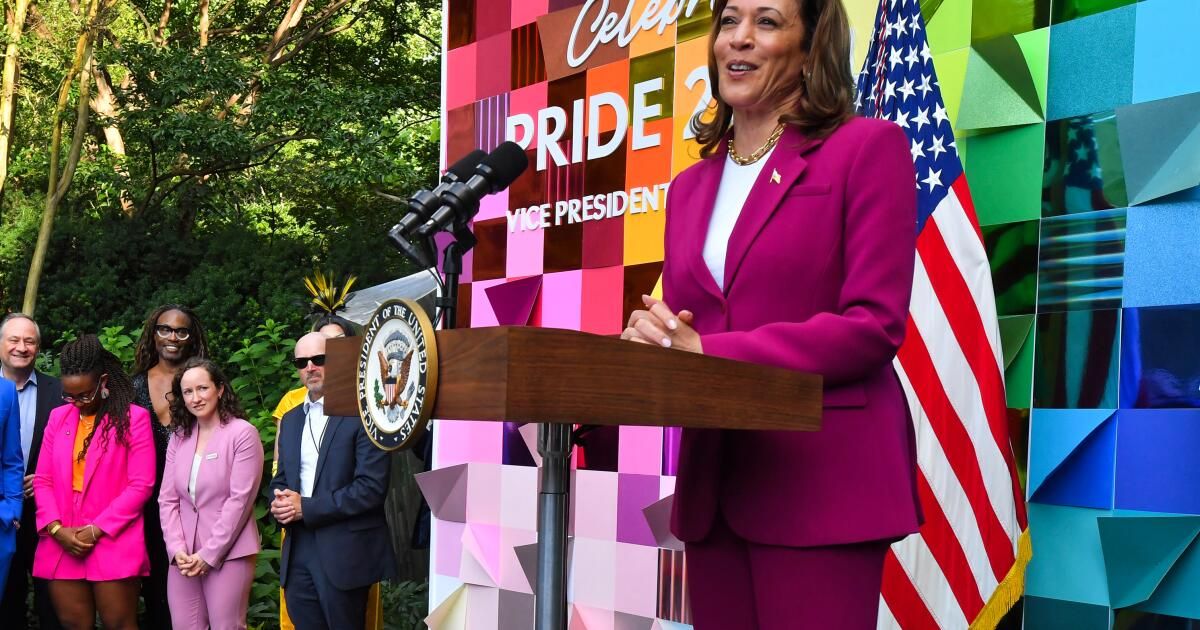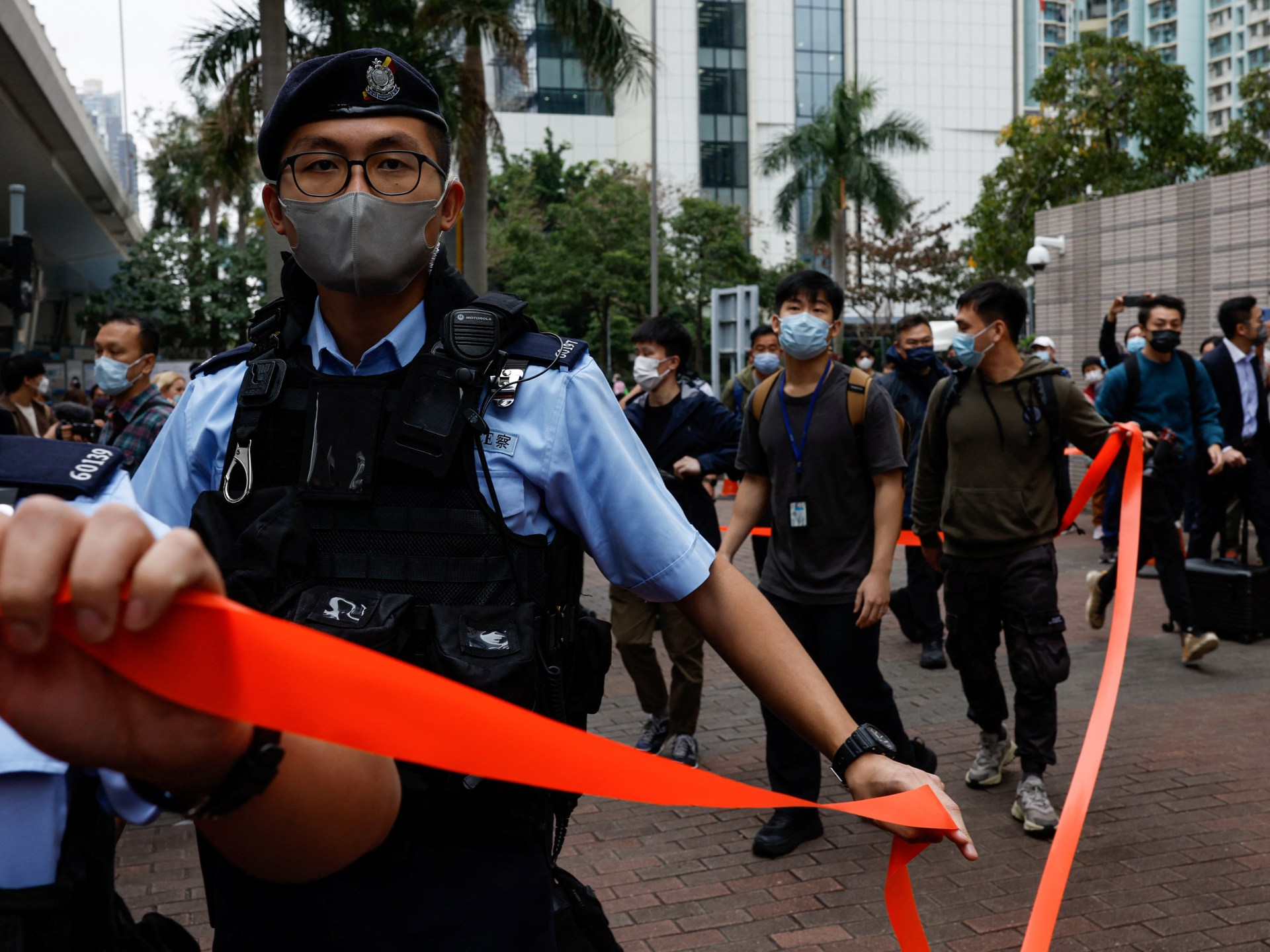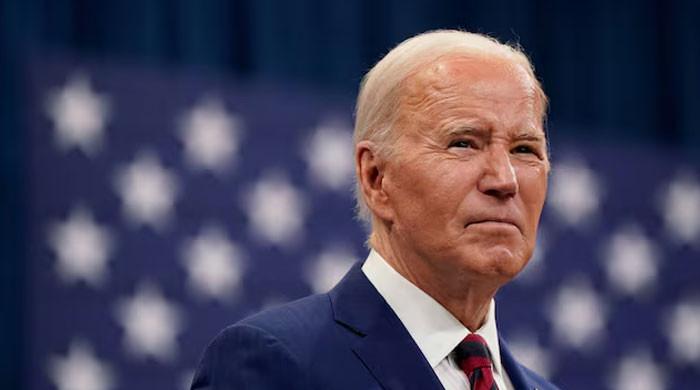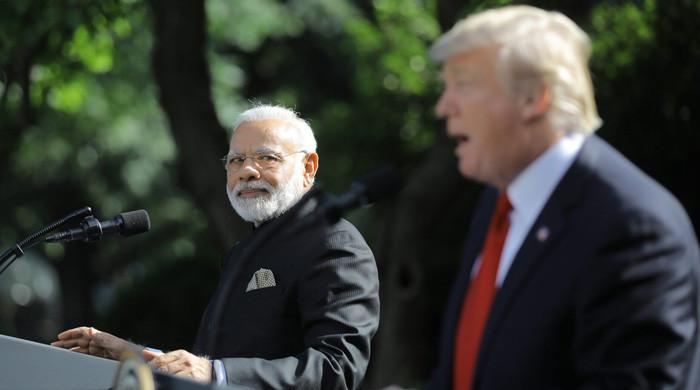At a recent celebration of San Francisco’s vibrant transgender past, speaker after speaker turned the crowd’s attention toward a troubling future, casting November’s presidential election as a turning point for the LGBTQ+ community and the nation as a whole.
“This election will determine our destiny,” said Sofia Sabina Rios Dorantes, deputy director of El/La Para TransLatinas, a local advocacy organization. “It will determine whether we will continue to face discrimination and marginalization in [a] disproportionate rate, or if we can continue moving towards the recognition and respect we deserve.”
For the record:
11:06 am August 8, 2024An earlier version of this article referred to an event in San Francisco celebrating Transgender Pride Month. The celebration marked Transgender History Month.
Last week, the third annual kickoff of Transgender History Month — the first to also be recognized at the state level — was a chance to celebrate the progress of the transgender community in one of the country’s most enduring havens for LGBTQ+ people, with champagne served beneath the ornate dome of San Francisco City Hall. It was also a show of defiance at a perilous time for queer people nationwide.
Thousands of people take part in the All Black Lives Matter solidarity march to commemorate LGBTQ Pride Month along Hollywood Boulevard in Hollywood in 2020.
(Genaro Molina / Los Angeles Times)
In three months, Americans will choose between Vice President Kamala Harris, a Bay Area native and longtime LGBTQ+ ally, and former President Trump, who has a long history of attacking gay rights and has aligned himself with some of the most virulently anti-LGBTQ+ political groups in the country.
In conversations with family and nights out with friends, at gay bars, organizing meetups and on a virtual call to some 20,000 queer people last month, many LGBTQ+ Americans are making it increasingly clear that they view Trump and the broader Republican agenda as an existential threat.
“It’s not an exaggeration to say that our lives are at stake,” said Honey Mahogany, executive director of the San Francisco Office of Transgender Initiatives. “What matters is whether we can survive or whether we will find ourselves in a situation where we fear for our lives.”
The candidates' positions
Ahead of the Human Rights Campaign’s 20,000-person rally last month, the group published a letter of support for Harris written by more than 1,100 LGBTQ+ leaders, organizers and celebrities.
The letter praised Harris for her decision as California attorney general not to defend Proposition 8, a state ballot measure banning same-sex marriage, and for her support of the federal Equality Act, which would ban anti-LGBTQ+ discrimination in employment, housing and other areas.
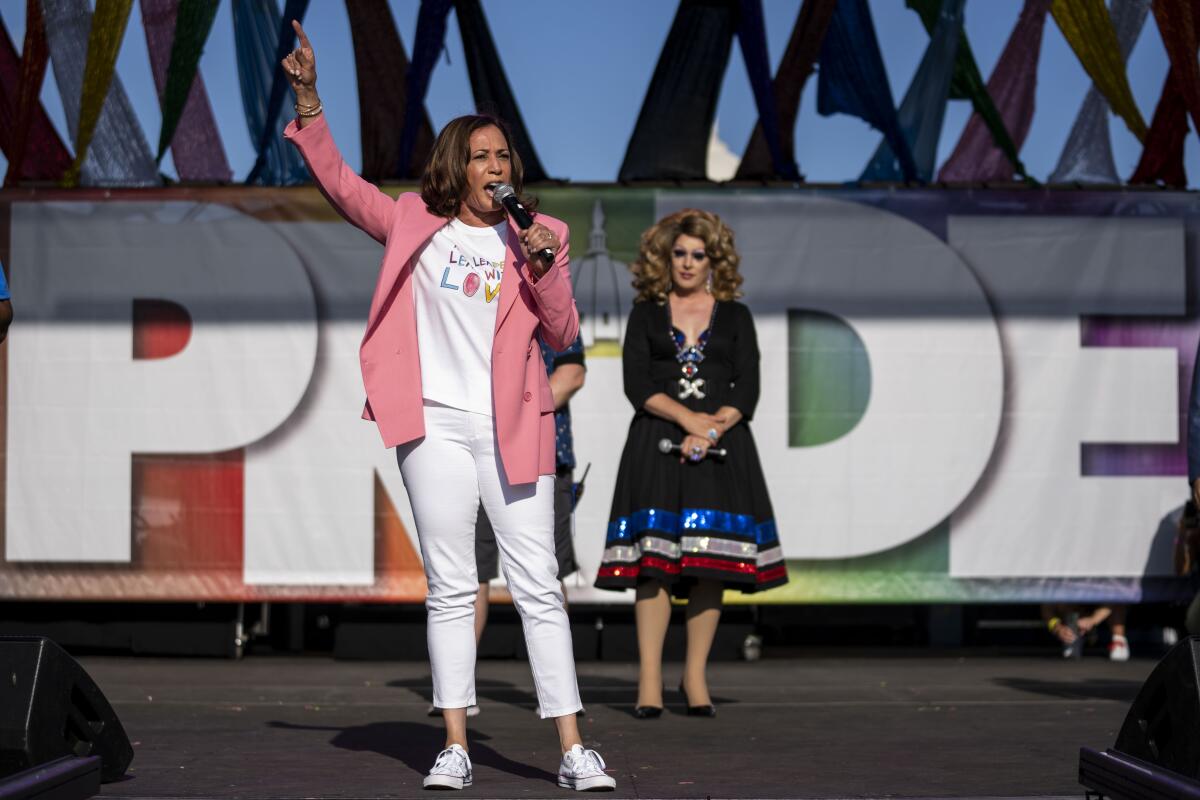
Vice President Kamala Harris makes surprise appearance at Capitol Pride DC in Washington in 2022.
(Kent Nishimura/Los Angeles Times)
The letter praised the Biden-Harris administration as “the most pro-LGBTQ+ administration in history,” highlighting its support for anti-discrimination policies and LGBTQ+ healthcare protections in the U.S. and its advocacy for LGBTQ+ rights globally.
On the call, Mawuli Tugbenyoh, senior co-president of the Alice B. Toklas LGBTQ Democratic Club in San Francisco, said Harris has been a queer ally since before her first election as San Francisco district attorney in 2003 and is genuine in her allyship.
“Vice President Harris has always been there for us and has fought for our community every step of the way,” Tugbenyoh said.
On Tuesday, queer rights groups also praised Harris’s choice of Minnesota Gov. Tim Walz as her running mate. They noted that Walz has a history of support dating back to the 1990s (when, as a professor, he served as an adviser to his school’s gay-straight alliance) and that, as governor, he has signed bills banning so-called conversion therapy and protecting gender-affirming care.
The same organizations have called Trump a major threat to queer families.
Trump appointed anti-LGBTQ+ officials throughout his administration. His Department of Education revoked school protections for transgender students, while his Justice and Health and Human Services departments rescinded anti-discrimination protections for transgender people, including in health care settings.
Trump appointed a list of judges deemed anti-LGBTQ+ and banned transgender people from serving in the military, a policy President Biden reversed. In more recent years, Trump-aligned Republicans have introduced a flurry of anti-LGBTQ+ bills at the local, state, and federal level, prompting the Human Rights Campaign to declare a “state of emergency” for queer Americans last year.
Concerns have only grown since the release of Project 2025, a blueprint for a second Trump term drawn up by a host of former Trump aides, the Heritage Foundation and more than 100 other conservative groups. The plan — which Trump has sought to distance himself from despite having close ties to its authors — questions the existence of transgender people, calls the rainbow flag a “divisive symbol” and calls for a “biblically based” definition of marriage and families.
Trump’s running mate, Sen. J.D. Vance of Ohio, who also has close ties to the authors of Project 2025, has attacked LGBTQ+ rights and mocked queer people. Vance has opposed protections for same-sex marriage, LGBTQ+ workers, and gender-affirming health care, called LGBTQ+ activists “preppers,” and delayed the confirmation of foreign diplomats by questioning their support for LGBTQ+-friendly initiatives.
Trump has also outlined several anti-LGBTQ+ policies in “Agenda 47,” his plan for a second term. It says Trump would end all federal programs “that promote the concept of sex and gender transition at any age,” withdraw Medicaid and Medicare funding from hospitals that provide gender-affirming care to children, ensure “severe consequences” for teachers who acknowledge the identity of transgender students, and revoke federal funding to their schools.
A campaign video about the plan concludes with the demonstrably false claim that the existence of transgender children “had never been heard of” until “the radical left invented it just a few years ago.”
“We are not going back”
Not all LGBTQ+ people support Harris. Stephen Schumacher, a 33-year-old gay political consultant, helps run the Detroit chapter of Log Cabin Republicans, an organization for conservative LGBTQ+ people. He supports Trump.
Schumacher pointed to the Republican Party’s removal of its longstanding opposition to same-sex marriage from its platform this year — after Trump ordered the language to be scaled back — as evidence that the party is changing its stance on the issue. He said the Log Cabin events he attended at the Republican National Convention in Milwaukee last month were well-received.
“I feel like my rights are protected,” Schumacher said.
Richard Grenell, a gay Trump loyalist and former acting director of national intelligence in the Trump administration, once called Trump “the most pro-gay president in American history” and this week predicted the Republican nominee “will win 50% of the gay vote.”
Grenell, of California, has been critical of transgender youth rights and the Equality Act, and has been singled out by queer groups as anti-LGBTQ+. On Wednesday, he picked up on a Republican talking point about Walz, saying Minnesota’s protections around sexual orientation somehow benefit pedophiles.
Across the country, many queer people find such beliefs disconcerting, if not repugnant.
Jim Obergefell, the lead plaintiff in the 2015 Supreme Court case that granted same-sex couples the right to marry nationwide, said it's clear that LGBTQ+ rights, including the right to marry, are under threat.
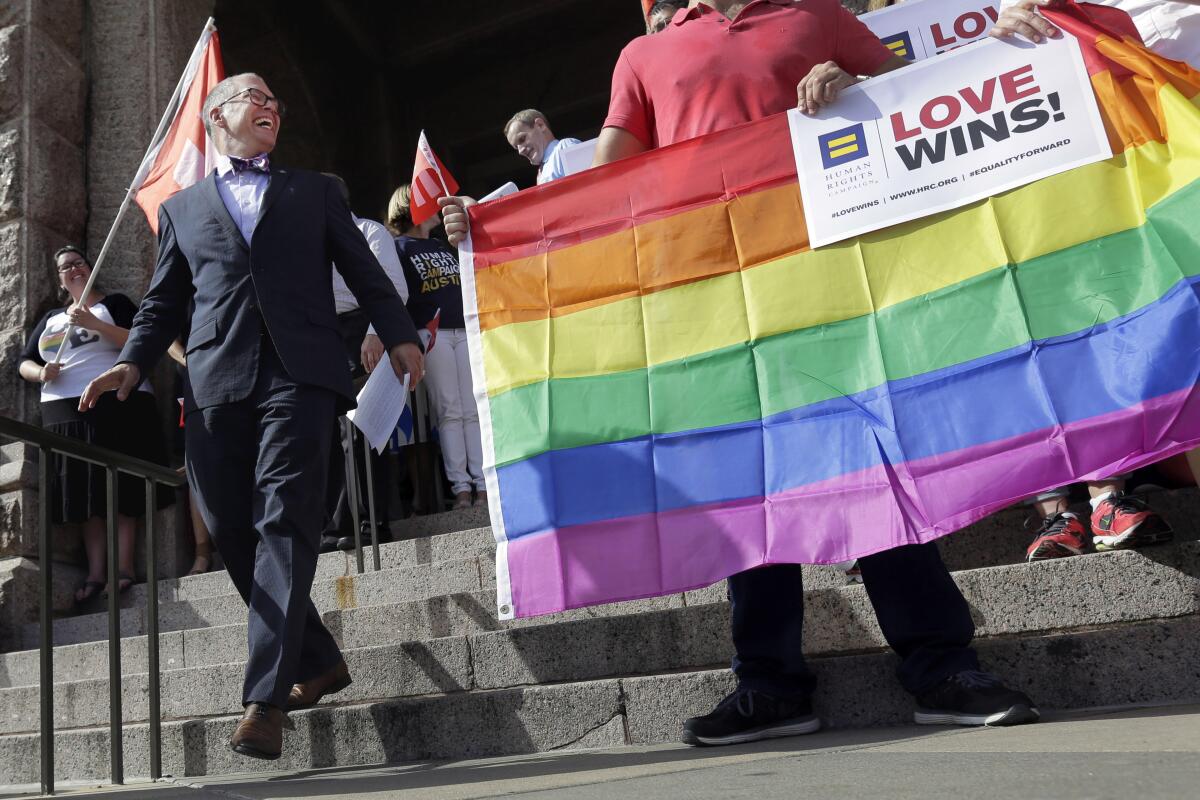
Jim Obergefell, the lead plaintiff in Obergefell v. Hodges, the Supreme Court case that legalized same-sex marriage nationwide, arrives for a news conference on the steps of the Texas Capitol in Austin in 2015.
(Eric Gay/Associated Press)
“The Republican Party has made it clear through statements, through policies, through basically everything they’ve done, that they do not believe queer people deserve the same rights, the same respect, the same dignity,” Obergefell said.
Rep. Mark Pocan (D-Wis.), who is gay and serves as chair of the Congressional Equality Caucus, said LGBTQ+ people have watched in recent years as Republicans have launched attack after attack on gender-affirming health care, pride flags, drag queen story hours, queer books and the mere mention of being gay in schools — and they know it will only get worse under Trump.
“There is a real regression in the Republican Party on equality and I think almost anything could be pushed through,” Pocan said.
Among those attending the Transgender History Month celebration in San Francisco was state Sen. Scott Wiener, who is gay. “We know there are forces in this country, and we’re seeing it more broadly now with Project 2025, [who] “They’ve never gotten over the fact that we’re not in 1950 or 1850 or whatever they want to take us back to anymore,” he said. “They’ve never gotten over that, and they want us all gone.”
“Of course,” Wiener said, “we're not going anywhere.”
Donna Personna, a 77-year-old transgender attendee who has lived in San Francisco since her teens, said Trump and other Republicans pretend people like her never existed because they don’t want to acknowledge that the American past they want to see returned was a harsh and unfair place for many.
By contrast, Harris has made “We’re not going back” a campaign slogan, Personna said. “And I agree with her on that.”

